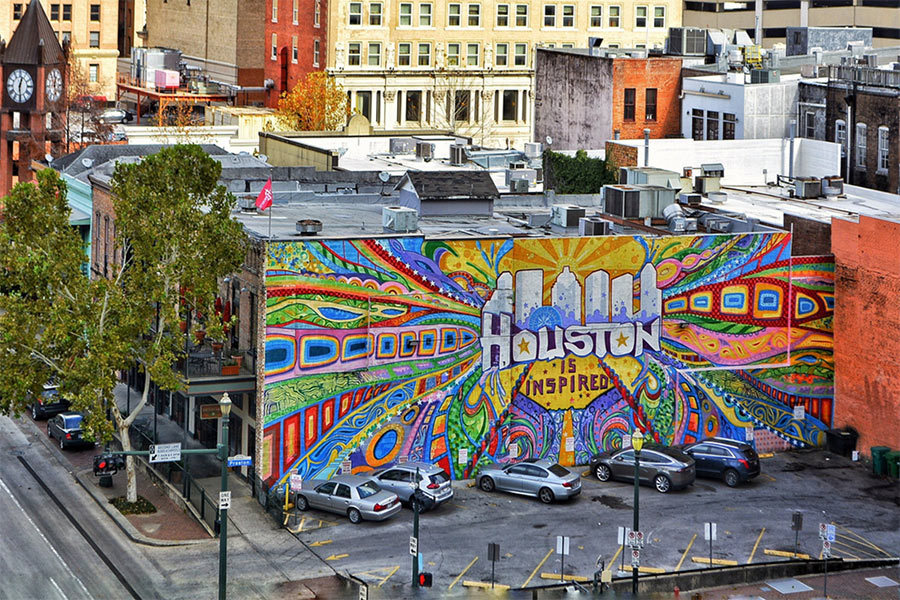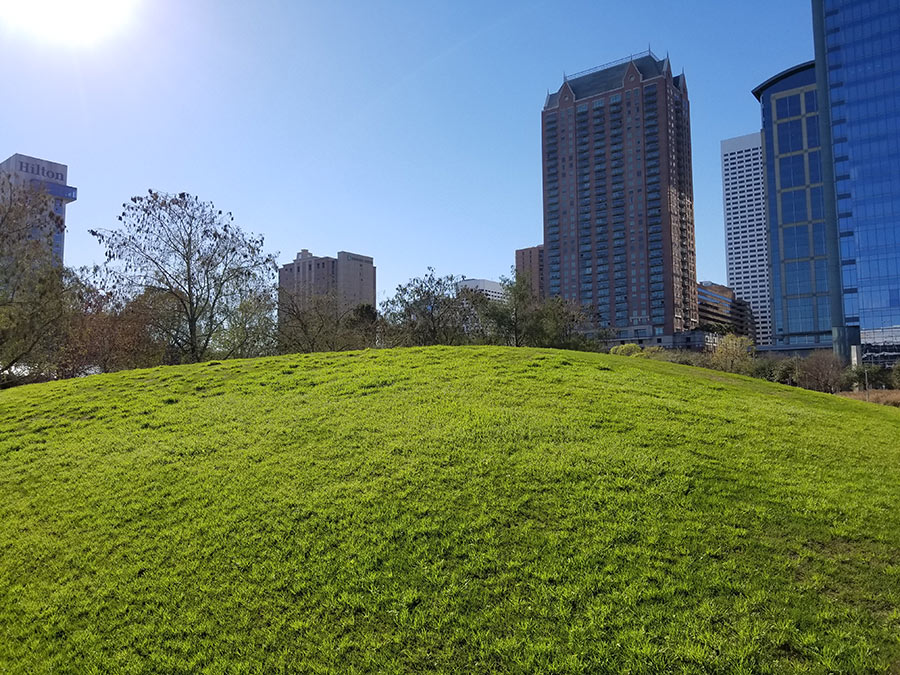
- Bar Owners Say Noise Ordinance Attacking Their Livelihood, Damaging Houston’s Reputation [Houston Press; previously on Swamplot]
- Four Houston Communities Getting $151M in Ike Funds [KUHF]
- ‘Maginot Line’ of Galveston Beach Bulkheads Predicted in Aftermath of Supreme Court’s Open Beaches Ruling [Houston Chronicle]
- Galveston Art Boom as Galleries and Businesses Open, Expand [Galveston County Daily News]
- Hundreds of Shoppers Turn Out for Laniers’ High-End Tag Sale [KHOU]
- Galleria Owner Now Largest Real Estate Company in the World [Click2Houston]
- Time Running Out To Use State Funds for Proposed Bellaire Town Square Disc Golf Course [Bellaire Examiner]
- Officer Pins Alligator in Conroe Back Yard [Courier of Montgomery County]
- Houston Named One of Top 25 U.S. Travel Destinations, Ranked Ahead of Sedona, Napa, Austin, Philadelphia [TripAdvisor via Houston Chronicle]
Photo of the Fred Hartman Bridge: Jackson Myers via Swamplot Flickr Pool





Trip Advisor’s overview is a bit outdated:
“…Astrodome that links with two Six Flags theme parks to create one gargantuan entertainment complex…”
lol, never thought of that:
“Even the architecture makes big, bold statements, like the medical center towers that resemble two giant syringes. ”
I’m glad they know what we all already knew:
“The midday heat is easily escaped inside…”
Bar owners have a right to make $, and homeowners have a right to quiet enjoyment of their property. Those rights are not imcompatible. And, the noise ordinance isn’t cryptic. It’s actually pretty simple. Go stand outside your establishment. If you can hear noise from inside your bar polluting the air outside, you are in violation. It’s not hard. The bar owner’s rights to play music within their establishment are not paramount to the homeowner’s similar rights to not have music blasted into their homes. And, if the bar owners insist on playing music so loud that it must spill into the night air, get a danged permit.
What if the bar owners were there first? If you don’t want to hear loud music, don’t move next to a bar and then start complaining about it. It’s like they rolled around in a big steaming pile of dog feces and then complain about the smell.
so the new noise ordinance is nageatively impacting Houston’s previous record as being a horrible city to tour in with little draw for independent bands?
i doubt it, but that would be impressive. everyone already knows to expect the worst when rolling through this town.
And what if the surrounding homes were built 200 years ago by a family of vampires who still live in the neighboring houses today? Regardless of whether you bought your house 20 years ago, yesterday or buy it tomorrow, you have a right to quiet enjoyment. It’s in the “bundle of sticks” property owners enjoy. The answer for bars is to buy their neighbors out, like the Distillery on White Oak and Fitzgerald’s and rent the property to their employees, pack up and move to a less residential area or turn the music down. Seems like the last option is pretty easy. Again, it’s not that hard.
A right to “quiet enjoyment” in the bundle of rights? I’m sorry, but that’s just stupid. For instance, a homeowner is not entitled to eminent domain compensation if the toll road authority builds a highway next to your parcel but not on top of your parcel.
To those businesses complaining about having to keep their music down in the middle of the night – tell me where you live so that I can pull into your driveway and blast music from my car while you’re trying to sleep.
There needs to be a balance between the right of businesses to operate and the right of others in the neighborhood to rest peacefully. The new city ordinance, while possibly flawed, is at least a step in the right direction towards protecting the rights of homeowners.
@mel – “Go stand outside your establishment. If you can hear noise from inside your bar polluting the air outside, you are in violation.” By this standard, 2 people having a conversation inside the entryway to a bar as someone opens the door to walk in will put the bar in violation. Or put another way, by this standard, a cop could cite you for having a conversation on your front porch if its audible from the sidewalk. Without an explicit standard for what constitutes excessive noiose (aka metered decible readings), this ordinance gives the police the right to harass anyone they want whenever they want.
If you don’t want to hear loud music late at night, don’t move somewhere that there are established bars/clubs/nightlife. i.e. Washington Ave, behind Avant Garden, next to Boondocks. It is silly. The post office next to my apartment makes ungodly racket 6 days a week at 4:00 in the morning. The place has been there since at least the 50’s. If you don’t like the smell of garbage, don’t move next to a dump. If you don’t like the sounds of loud cars and trucks, don’t live on a busy street. If you don’t like trains, don’t buy a houste near the tracks. If you can’t deal with club noise, don’t move next to one. It is that simple. There are neighborhoods all over Houston that are sanctuaries from that sort of “disturbance”.
In addition to the lack of common sense element, the law leaves way too much decision making power in the hands of the police. There used to be a decibel standard. Now any cop can walk into a bar that a cranky neighbor complains about and issue tickets without any real evidence. It may not hold up in court, but it wastes the time and money of the person that is charged. TABC uses takes into account the number of citations issued when renewing liquor licenses. A bar loses it’s liquor license, it goes out of business. It is a terrible precedent to set.
Bottom line: If you can’t deal with the disadvantages along with the great advantages of living in a hip, trendy neighborhood, go back to wherever you came from. I’m sure you’ll find something to complain about there.
Why did the COH do away with the previous decible standard?
Didn’t that ordinance work?
Our ‘hood had an issue with a bar across the freeway from us several years ago. On Sundays they often had outdoor bands that would play well into the nights. We could hear the music like it was just down the block.
Police paid visits and used the meters and after a number of citations, the owners took the bands back inside.
The place eventually folded but I don’t think it had to do with the bands.
A little courtesy goes a long way to happy cohabitation. Bar owners should be as sensitive as possible to neighbors desires and neighbors should realize that businesses can’t control everything. Don’t buy next to a commercial area if you can’t handle a little noise (even if the current businesses are quiet). But businesses that go out of their way to ignore residents should expect legal harassment, regardless of “rights”. Compromise and empathy is the only solution, else we’ll all have to live on our own 20 acres of solitude, which will require a much bigger planet.
There is still a decibel standard. The big change is that the police do not have to use a sound meter to be able to write a ticket. They are trained to be able to judge whether the sound levels are excessive without having to use a decibel meter. The problem was that the City only had 300 meters. It was frequently impossible to get an office to respond to a sound complaint (non-emergency) in time to catch the violation. Now, they do not have to track down an officer who has a sound meter. This has allowed for more vigorous enforcement of the law.
Also, the right to be free of sound pollution is a part of the bundle of sticks a property owner has, just not the same bundle as the covenant of quiet enjoyment, which runs from grantor to grantee or landlord to tenant. Common law nuisance recognizes a right to be free of sound pollution and the municipal standard is regularly adopted by courts in nuisance lawsuits. So, the neighbors can also hire a sound engineer to do a study and file a lawsuit seeking damage and injunctive relief. Then, the bars and clubs will wish they only had to deal with the cops.
Bands are all too damn loud, period. I suppose their ‘music’ is so crappy they have to beat you senseless with decibels. They’re even worse than the noise inside most popular restaurants. I don’t why people even go to these places if you can’t have a conversation with someone 2 ft away. And they call this ‘socializing’.
Niche, our rights of quiet enjoyment include the right to be free of private nuisance, including loud noises and bright lights. I wonder how stupid you will think noise pollution is if it eventually affects you: Doesn’t affect Niche = GOOD! Does affect Niche = BAD!
You’re telling me that dispatching an officer with one of the 300 decibel meters was a big problem, but according to this article, precisely 300 officers have been trained on the enforcement of this ordinances. How much you want to bet that the officers that got trained were the ones with the equipment?
——————
Although I am not a lawyer, I can see that Sec. 42.01(a) of the Texas Penal Code addresses noise offenses as follows:
“A person commits an offense if he intentionally or knowingly:” (5) “makes unreasonable noise in a public place other than a sport shooting range, as defined by Section 250.001, Local Government Code, or in or near a private residence that he has no right to occupy.”
Furthermore, from 42.01(c ):
“A noise is presumed to be unreasonable if the noise exceeds a decibel level of 85 after the person making the noise receives notice from a magistrate or peace officer that the noise is a public nuisance.”
So apparently, the owner of a public venue other than a shooting range (such as a bar, but not a house or ranch or factory) retains the right to be loud until informed otherwise. Neighbors have do not enjoy a “property right” to silence, only silence from certain sources and not others, and then not automatically but only if they are proactive and diligent about seeking enforcement.
And according to Houston’s stricter noise ordinance (Ch. 30 of the Code of Ordinances), the only circumstances under which a police officer’s senses may be relied upon as prima facie evidence to issue a citation for noise is if the earth or a structure are vibrating or resonating (Sec. 30-5(b))…or if they can hear noise from an automobile within fifty feet of it and from a sidewalk (Sec. 30-7(a)). Under all other circumstances, measurements must be taken with a decibel meter from the property line of the non-residential property or from a residential property where sound is being received (Sec. 30-6). As with the state law, Houston property owners do not have a right (one that is alienable) to silence; only to certain types of silence with numerous exceptions, pitfalls, and vexing enforcability issues.
@ Mel: I used to live 750 feet from 610. And before that, I lived 1,000 feet from active railroad tracks and kept my windows open at night. The sound that eminated from these sources would definitely exceed City or State standards, but is exempted. I had no right to silence and nor did I care.
I even sort of miss the trains and the booming noises from the hump yard a mile to the south. I wish we had that in the Boulevard Oaks area and the Museum District. It’d make them a little more authentically Houston.
If bars are to blame for violating the peace, then I want the CoH to outlaw motorized lawn care equipment. Talk about invasion of a peaceful enjoyment of a day at home. So Chuy can blow trash down the street for someone else to worry with. Whiny bar neighbors are showing signs of that Ashby disease.
According to the City, the new noise ordinances came about for two reasons. First, they wanted to regulate low frequency noises that are more disruptive than high frequency noises. Second, more importantly, the decibel meters that they had to use were of a special type, specially calibrated to the satisfaction of lawyers. They were extremely expensive, and reaching the end of their useful lives. It’d have cost several hundred dollars each in order to repair or replace them.
.
On a different note, let’s get away from the ‘don’t move next to a bar and the noise won’t bother you’ argument. There are drawbacks no matter where you live. That doesn’t mean you just put up and shut up. And it doesn’t mean you keep moving, thinking that you’ll eventually find the perfect place to live. You work to mitigate the problems – either on a micro-scale (soundproofing your house) or on a macro-scale (working with your neighbors to build sound barriers or convince a noisy bar to leave.)
So those are the lame excuses the city gave for getting rid of the decibel meters, ZAW? Not good enough. They should have to prove you are in the wrong before giving you a ticket, just like anything other violation.